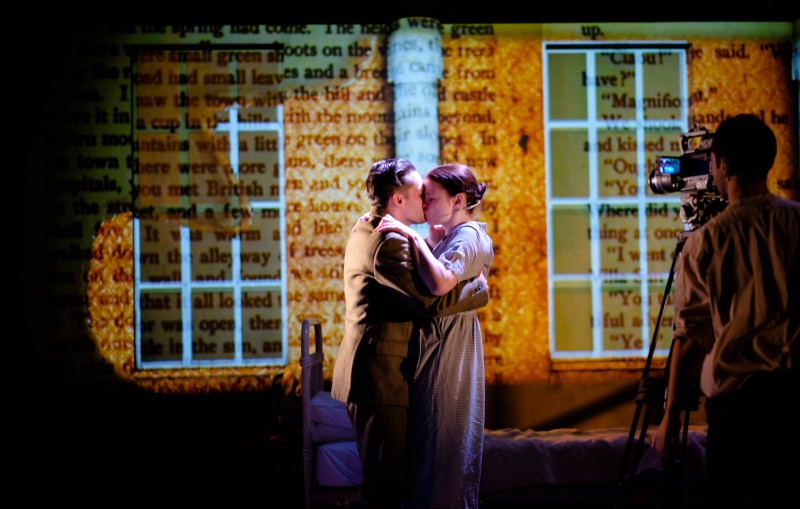
Photo – Ed Waring
The choice of A Farewell to Arms, centenary aside, seems an odd one for this ambitious and popular company. Ernest Hemingway’s prose may be muscular and vivid, but it is rarely poetic. As a writer he had a determination to keep his work drained of expressiveness. His dialogue has a formality that is, frankly, often excruciating.
imitating the dog takes the book to heart, and rather than use it as a frame for a drama, sticks doggedly to the text, attempting to get inside the book and render it as an interactive experience. The actors work as an ensemble, with all except the central two lovers playing several roles. They also are observers of their own story, filming the action and commenting, reportage style. Multiple projections expand the space and create atmospheric effects, on a cleverly adaptable set designed by Laura Hopkins.
The book tells the story of an American, Frederick Henry (Jude Monk McGowan) serving as an ambulance driver with the Italian army, as had Hemingway. There is camaraderie between men and plenty of high-octane action as the war progresses in unflinching horror. Translating some text into Italian, well spoken to my ears by a largely non-Italian cast, allows for the surtitling of the whole play – a welcome concern for accessibility. The second half of the play is the horror of childbirth, with Henry’s lover Catherine Barkley’s (Laura Atherton) parallel suffering; a metaphor literally worked to death. Henry now realises the futility of war and exits with the final line: ‘After a while I went out and left the hospital and walked back to the hotel in the rain.’ That the final line fails to resonate is symptomatic of a piece that uses bombast in place of genuine emotion.
Buried within all the projected imagery, the layering of Greek chorus, the out-of-synch relays, war reporters and soundscape (a good score by Jeremy Peyton Jones) are competent performances from the cast of six, with Matt Prendergast as Rinaldo providing some necessary energy. Yet because the characters are largely talking to camera, their relationships to each other and to the audience are rarely felt. Rather than connecting to us, which is one of the company’s main aims, we are distanced throughout and even the anguished cries of Catherine’s nightmare labour fail to properly affect.
The combined creative team of Pete Brooks, Andrew Quick and Simon Wainwright, produced with The Dukes, Lancaster, Live at LICA and Cast in Doncaster, with all their years of experience and success in theatre-making, seem to have spent far too much time on the form of the piece, rather than telling the story.
